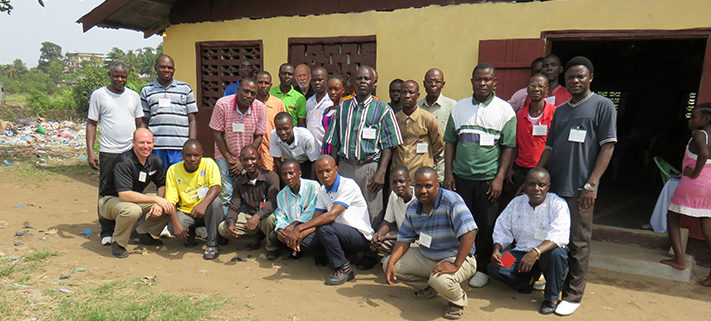One woman is brought to the brink of hopelessness, where she found forgiveness and joy again through her Savior.
Amanda M. Klemp
When DiAnn Krigbaum talks about her life story, she doesn’t play the victim. She doesn’t make excuses. She connects the dots. She can see how she went from viewing herself through the lens of condemnation to viewing herself through the lens of God’s grace. She uses her experiences to speak that language, the language of pain and of regret, to others who are going through their own trauma or have made their own mistakes. She points them to the answer she found.
Growing up
Krigbaum grew up in south-central Wisconsin. She was the youngest of five, with four older brothers. Her mom was Lutheran, and her dad was confirmed when she was a child. “My father was a truck driver and my mom worked in a factory, so pretty much my brothers took care of me and we fended for ourselves,” she says.
Her father was often away from home, but when he was at home he didn’t always treat his family well. “My mom tried to hold it all together. I saw struggles between my parents and some of the treatment of my family members,” Krigbaum recalls.
As she was entering middle school the family moved, and she began attending a WELS grade school. Then she went on to attend Luther Preparatory School. “I didn’t really know healthy family relationships or dynamics. I didn’t understand that. I was used to chaos. I cherished the Prep family I had. I love, love, loved my experience there. It felt like my family,” says Krigbaum.
As a teenager, she decided to be a police officer. She says, “The role in my life was to be the helper, the responsible one who took care of my parents and their squabbles and mentoring and negotiating and refereeing. So, I think it seemed like a really good fit for me.”
But the transition from high school to career wasn’t smooth. “I floundered between high school graduation and trying to find my way. I didn’t have the confidence and I didn’t know where to start,” she says. “I didn’t know any police officers. And I struggled with the party life for a number of years.”
She attended church through those years but didn’t feel a close connection to her Lord. “Because I didn’t understand healthy relationships, I didn’t know what having a personal relationship with the Lord looked like and felt like,” she says. ‘I knew it was something I was supposed to do, but it wasn’t always out of love for God.”
Enduring difficult relationships
At 24, Krigbaum married her first husband. “It was a huge mistake. I threw up my whole wedding day,” she says. In less than two years, she left her first husband and started attending a different WELS church, looking for a fresh start. But she soon left that church. Then she met the man who would become her second husband and a few months later was pregnant with twins.
“About eight or nine weeks in, they did an ultrasound and found out I was having twins. In my mind, that was God telling me I should marry this man,” Krigbaum recalls. “I made a decision on a Wednesday to get married to him and said to him, ‘Okay, stop nagging me. Let’s do it Saturday before I change my mind.’ And in three days, we were married by the justice of the peace.”
She continues, “After we got married, there were a couple more hostile outbursts that devastated me and broke my heart because I didn’t understand. I thought he loved me. When I tried to talk to him about problems, he just got angry with me and would leave. And that is how our marriage continued for 19 years,” she says.
While pregnant, Krigbaum applied to and was accepted to the police academy. When her twin sons were three months old, she began her career as a police officer. “During this time, as a police officer, my career was very successful,” she says. “My marriage was very painful, so I put more energy into my job because it seemed like I got more benefit from work than from my marriage.”
In addition to a successful career, Krigbaum’s family also grew. She adopted a daughter through the foster system when her sons were 12.
Throughout the years, she would occasionally see a therapist but didn’t want to talk about her marriage. “If I validated the painful marriage, then I would have to deal with it, so I kept pushing that subject away,” she says. Besides, despite all the problems, there was still a big part of her that wanted her marriage to work.
The marriage didn’t get any better. She starting breaking down badly enough that she was missing work and was even hospitalized with migraines and dehydration. Her marriage hit a brick wall. “I could not look at him; I couldn’t move. I became numb,” she says. They tried seeing a marriage counselor, but as a couple they never addressed the problems. He accused her of being too needy. She cried at almost anything and suffered daily headaches. One therapist diagnosed her with post-traumatic stress disorder. She moved out.
She admits she wasn’t connected to God. She wasn’t experiencing the Christian joy she heard others talk about. All she knew was anger, sadness, and hopelessness. She didn’t feel sure of God’s forgiveness. Reaching her absolute lowest point, she began to turn to God and his Word.
“I recognized that I had been doing things my way and that my way was not working,” says Krigbaum. “And slowly, through his Word, it’s like my eyes became open. Before that, I was hearing, but I wasn’t understanding.”
Finding lasting peace
Krigbaum’s pastor at the time became a certified chaplain and started meeting with her. “God sent a chaplain to me,” she says. “Instead of condemning me, he started giving me the gospel.”
She helped her pastor navigate the world of the police force and, with his encouragement, started taking chaplaincy courses herself. She even served her former police department for a while.
Now she volunteers and mentors young women who are experiencing crisis pregnancies. She can share her own story. She has also started a couple of support groups for police officers and for families struggling with mental health problems.
“My message that I try to give families who are hurting and going through turmoil and trauma—because it’s becoming so prevalent—is that this is not the ending of God’s story for you. It’s a transformation to God’s beginning of a new story, a new life for you,” she says. “I want so much for people to understand how important it is to confess, repent, understand the ugliness of your life, and say it to God without fear of judgment.”
She concludes, “I am so thankful for the blessings he has given me, because I recognize now that the things I chose or that I thought I wanted were not lasting. It took me years to recognize that God is the giver of all good things.
“I am so thankful for God’s unlimited mercy and grace.”
Amanda Klemp, WELS editorial projects manager, is a member at Living Word, Waukesha, Wisconsin.
Do you have a manuscript, idea, or story from your own life you’d like to share for use in Forward in Christ or on wels.net? Use our online form to share it to our editorial office for consideration.
Get inspirational stories, spiritual help, and synod news from Forward in Christ every month. Print and digital subscriptions are available from Northwestern Publishing House.
Author: Amanda M. Klemp
Volume 103, Number 7
Issue: July 2016
Copyrighted by WELS Forward in Christ © 2021
Forward in Christ grants permission for any original article (not a reprint) to be printed for use in a WELS church, school, or organization, provided that it is distributed free and indicate Forward in Christ as the source. Images may not be reproduced except in the context of its article. Contact us






